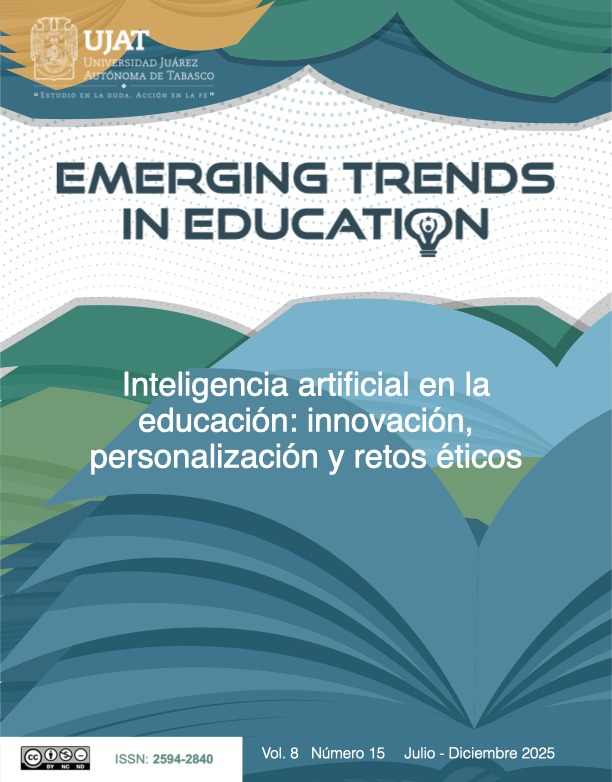Ethical implications of the use of artificial intelligence in higher education
DOI:
https://doi.org/10.19136/etie.v8n15.6343Keywords:
Ethics, Artificial Intelligence, Higher Education, University, LearningAbstract
The implementation of Artificial Intelligence (AI) in higher education poses significant ethical dilemmas that require a deep understanding to ensure its beneficial and equitable use. This research explored the ethical challenges associated with the use of AI, specifically ChatGPT, in the university setting. The methodology was developed in two phases: a systematic literature review and field research using surveys of university students. The results revealed a generally positive attitude toward ChatGPT, with strong recognition of its usefulness and the importance of AI literacy. However, concerns about academic integrity and the potential promotion of mental laziness were identified. A weak correlation was found between major choice and ethical perceptions, while age showed no significant influence. The study also highlighted the need to improve citation and source verification practices when using AI. These findings provide a solid foundation for the development of institutional policies and educational programs that address the ethical challenges of AI in higher education, emphasizing the importance of tailored approaches according to academic discipline.
References
Alonso-Rodríguez, A. M. (2024). Hacia un marco ético de la inteligencia artificial en la educación. Teoría de la Educación. Revista Interuniversitaria, 36(2), 79-98. https://revistas.usal.es/tres/index.php/1130-3743/article/view/31821
Buzzanell, P. M. (2023). Risk, resilience, and ethical considerations in artificial intelligence. Emerging Media, 1(1), 30-39. https://journals.sagepub.com/doi/10.1177/27523543231188274
Carrera Farran, X., & Pérez Garcias, A. (2023). Tecnologías digitales en educación: poniendo el foco en la ética : Editorial del número especial. Edutec, Revista Electrónica De Tecnología Educativa, (83), 1–6. https://doi.org/10.21556/edutec.2023.83.2829
Cathrin, S., & Wikandaru, R. (2023). The future of character education in the era of artificial intelligence. Humanika: Kajian Ilmiah Mata Kuliah Umum, 23(1), 91-100. https://journal.uny.ac.id/index.php/humanika/article/view/59741
Chan, C. K. Y. (2023). A comprehensive AI policy education framework for university teaching and learning. International journal of educational technology in higher education, 20(1), 38. https://link.springer.com/article/10.1186/s41239-023-00408-3
Choi, J. I., Yang, E., & Goo, E. H. (2024). The effects of an ethics education program on artificial intelligence among middle school students: Analysis of perception and attitude changes. Applied Sciences, 14(4), 1588. https://www.mdpi.com/2076-3417/14/4/1588
Dellepiane, P., Guidi, P. (2023). La inteligencia artificial y la educación: Retos y oportunidades desde una perspectiva ética. Question/Cuestión, 3(76), e859. https://doi.org/10.24215/16696581e859
Fajardo , G. M., Ayala , D. C., Arroba, E. M., & López, M. (2023). Inteligencia Artificial y la Educación Universitaria: Una revisión sistemática. Magazine De Las Ciencias: Revista De Investigación E Innovación, 8(1), 109–131. https://doi.org/10.33262/rmc.v8i1.2935
Gallent Torres, C., Zapata González, A., & Ortego Hernando, J. L. (2023). El impacto de la inteligencia artificial generativa en educación superior: una mirada desde la ética y la integridad académica . RELIEVE - Revista Electrónica De Investigación Y Evaluación Educativa, 29(2). https://doi.org/10.30827/relieve.v29i2.29134
Grassini, S. (2023). Shaping the future of education: exploring the potential and consequences of AI and ChatGPT in educational settings. Education Sciences, 13(7), 692. https://www.mdpi.com/2227-7102/13/7/692
García, R. A. P. (2023). La inteligencia artificial en el sistema educativo venezolano: oportunidades y amenazas. Revista Eduweb, 17(4), 9-15. https://revistaeduweb.org/check/17-4/1-9-15.pdf
Holmes, W., Iniesto, F., Anastopoulou, S., & Boticario, J. G. (2023). Stakeholder Perspectives on the Ethics of AI in Distance-Based Higher Education. The International Review of Research in Open and Distributed Learning, 24(2), 96–117. https://doi.org/10.19173/irrodl.v24i2.6089
Lameras, P., & Arnab, S. (2021). Power to the teachers: an exploratory review on artificial intelligence in education. Information, 13(1), 14. https://www.mdpi.com/2078-2489/13/1/14
Pierrès, O., Christen, M., Schmitt-Koopmann, F., & Darvishy, A. (2024). Could the Use of AI in Higher Education Hinder Students With Disabilities? A Scoping Review. IEEE Access. https://ieeexplore.ieee.org/document/10433192
Sariyasa, S., & Monika, K. A. L. (2023). Artificial intelligence and academic ethics in the era of Merdeka Belajar: how are Students' responses?. Jurnal Kependidikan: Jurnal Hasil Penelitian dan Kajian Kepustakaan di Bidang Pendidikan, Pengajaran dan Pembelajaran, 9(3), 986-995. https://e-journal.undikma.ac.id/index.php/jurnalkependidikan/article/view/8720
Sharonova, S., & Avdeeva, E. (2024). Smart Education: Social Risks and Challenges. In IoT, AI, and ICT for Educational Applications: Technologies to Enable Education for All (pp. 99-118). Cham: Springer Nature Switzerland. https://www.researchgate.net/publication/377509419_Smart_Education_Social_Risks_and_Challenges
Tramallino, C. P., y Marize, A. (2024). Avances y discusiones sobre el uso de inteligencia artificial (IA) en educación. Educación, 33(64), 29-54. https://doi.org/10.18800/educacion.202401.M002
Vargas, O. C., Fernández, M. D., Villalobos, B. S., & Sánchez, P. T. (2024). Implementación de la inteligencia artificial en la docencia: Experiencia de la Universidad Nacional, Costa Rica. Revista Paraguaya de Educación a Distancia (REPED), 5(2), 32-43. https://revistascientificas.una.py/index.php/REPED/article/view/4384
Downloads
Published
Issue
Section
License
Copyright (c) 2025 Emerging Trends in Education

This work is licensed under a Creative Commons Attribution-NonCommercial-NoDerivatives 4.0 International License.





























